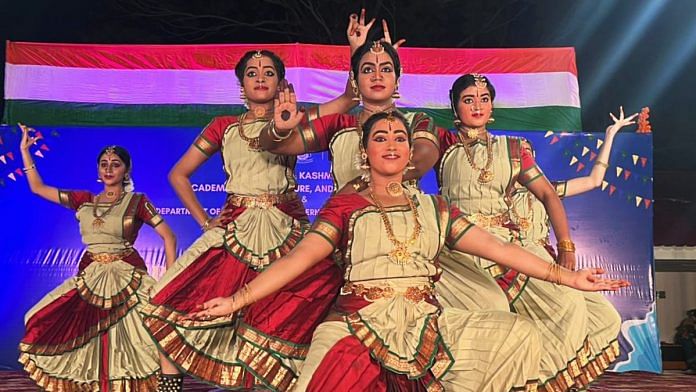Thank you dear subscribers, we are overwhelmed with your response.
Your Turn is a unique section from ThePrint featuring points of view from its subscribers. If you are a subscriber, have a point of view, please send it to us. If not, do subscribe here: https://theprint.in/subscribe/
“A defeated nation is not truly defeated until it loses its cultural values. A defeated mind, a defeated state, and a defeated nation often end up accepting the victor’s culture and ethos. Your liberation lies in the liberation of this nation.”
The Soul of a Nation: Culture as Identity
Culture is not simply a combination of language, festivals, music, or food. It is a living philosophy — a worldview passed down generations, through stories, scriptures, arts, and everyday life. It includes how a people perceive morality, purpose, relationships, and the universe. When a nation loses its cultural confidence, it loses the lens through which it understands itself.
This has been evident throughout history. Ancient civilizations like the Greeks, Mayans, and Mesopotamians flourished with distinct cultural identities. Their political downfall was tragic, but their true decline came only when their ways of thinking, speaking, and living were replaced by external systems. This is the essence of civilizational collapse.
India: A Civilizational Survivor
India stands as a rare example of a civilization that has withstood centuries of foreign domination without cultural extinction. From Alexander’s invasion (326 BCE), to the Mughal Empire (16th to 18th centuries), to nearly 200 years of British colonial rule (1757–1947), India was politically subjugated, yet culturally resilient.
Despite these conquests, core Indian philosophies like Vedanta, Yoga, Ayurveda, Bhakti, and Karma remained alive. Sanskrit texts were preserved in temples and gurukuls, oral storytelling continued in villages, and rituals adapted but never vanished. Even during British rule, when English education was imposed and Indian systems were ridiculed, leaders like Swami Vivekananda, Bal Gangadhar Tilak, and Rabindranath Tagore emphasized the restoration of Indian spiritual and cultural pride.
Fact: According to UNESCO, India is home to 43 intangible cultural heritage elements, one of the highest in the world — a testament to its civilizational continuity.
The Defeated Mind: Psychological Colonization
As Frantz Fanon brilliantly highlighted in The Wretched of the Earth, colonization is not just about political control — it is about shaping the minds of the colonized. When people begin to see themselves as inferior and adopt the values of the colonizer as superior, the defeat is complete.
This mental colonization is evident in post-colonial nations where local languages, attire, and philosophies are often dismissed in favor of Western standards. India too saw generations raised with an inferiority complex — taught to see Sanskrit as “dead,” Ayurveda as “unscientific,” and English as the only language of progress.
Fact: A 2018 survey by Pew Research found that in India, English is spoken by only 10% of the population, yet dominates government, higher education, and media — illustrating linguistic elitism rooted in colonial legacy.
Japan and Israel: Case Studies of Cultural Preservation
Contrast this with Japan, a country that modernized rapidly post-WWII but fiercely guarded its language, Shinto-Buddhist traditions, and social ethics. Today, it is one of the most technologically advanced nations, yet deeply traditional in spirit.
Similarly, Israel rebuilt itself in 1948 and resurrected Hebrew, a language that had not been spoken in everyday life for nearly 2,000 years. Today, it thrives as the national language — proving that cultural revival is possible even after exile and genocide.
Modern Threats: Globalization and Cultural Homogenization
In the 21st century, conquest no longer wears military boots. It comes through global media, consumer culture, and digital algorithms. Western norms, fashion, and ideologies dominate social media and entertainment, often diluting native thought systems.
Languages are disappearing at an alarming rate — one every 40 days, according to UNESCO. Indigenous cultures are being “globalized” into oblivion. And while global collaboration is valuable, blind imitation results in cultural void.
This is why the quoted statement is more relevant than ever: “A defeated nation is not truly defeated until it loses its cultural values… This nation’s liberation is your liberation.”
The Role of Youth and Education
The future of any culture rests with its youth. When children are educated about their nation’s literature, ethics, art, and spiritual wisdom, they grow with a rooted identity. But when education focuses solely on external achievements without grounding them in indigenous values, it produces brilliant minds with hollow hearts.
Fact: The National Education Policy (NEP) 2020 in India emphasizes the integration of local knowledge systems, Indian languages, and traditional arts — a much-needed shift toward cultural reclamation.
Conclusion: Cultural Confidence is Civilizational Survival
A nation that respects its past is not backward. A youth who speaks their native tongue is not less global. A civilization that honors its spiritual wisdom is not anti-modern. These are the signs of cultural confidence — not arrogance, but awareness.
The final defeat is not at the border, but in the classroom, in cinema halls, in self-perception. If we forget who we are, no flag can protect us. But if we remember — fiercely, proudly, humbly — then even in adversity, we stand undefeated.
Let us heed the wisdom:
“A defeated nation is not truly defeated until it loses its cultural values. A defeated mind, a defeated state, and a defeated nation often end up accepting the victor’s culture and ethos. Your liberation lies in the liberation of this nation.”
These pieces are being published as they have been received – they have not been edited/fact-checked by ThePrint.


